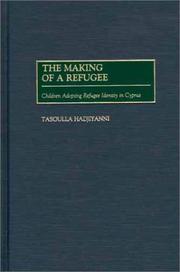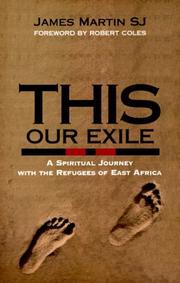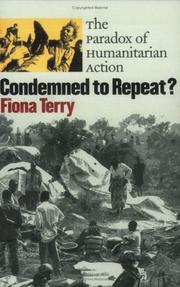| Listing 1 - 4 of 4 |
Sort by
|

ISBN: 0275973972 0313010811 9780313010811 9780275973971 1280373709 9786610373703 9798400681585 Year: 2002 Publisher: Westport, Conn. Praeger
Abstract | Keywords | Export | Availability | Bookmark
 Loading...
Loading...Choose an application
- Reference Manager
- EndNote
- RefWorks (Direct export to RefWorks)
Refugee children --- Enfants réfugiés --- Cyprus --- Chypre --- History --- Histoire --- Child refugees --- Children --- Refugees --- Greece --- Turkey
Book
Abstract | Keywords | Export | Availability | Bookmark
 Loading...
Loading...Choose an application
- Reference Manager
- EndNote
- RefWorks (Direct export to RefWorks)
Child welfare --- Refugee children --- Refugees --- Social integration --- Social workers --- Services for

ISBN: 1570752508 Year: 2002 Publisher: Maryknoll Orbis Books
Abstract | Keywords | Export | Availability | Bookmark
 Loading...
Loading...Choose an application
- Reference Manager
- EndNote
- RefWorks (Direct export to RefWorks)
Church work with refugees --- Missionaries --- Missionaries --- Biography --- Biography --- Martin, James, --- Jesuit Refugee Service. --- Societas Jesu --- Biography. --- Missions

ISBN: 080148796X 0801439604 0801468647 1336208171 0801468639 9780801468643 9780801487965 9780801487965 9780801468636 9781336208179 Year: 2002 Publisher: Ithaca ; London : Cornell University Press,
Abstract | Keywords | Export | Availability | Bookmark
 Loading...
Loading...Choose an application
- Reference Manager
- EndNote
- RefWorks (Direct export to RefWorks)
Humanitarian groups have failed, Fiona Terry believes, to face up to the core paradox of their activity: humanitarian action aims to alleviate suffering, but by inadvertently sustaining conflict it potentially prolongs suffering. In Condemned to Repeat?, Terry examines the side-effects of intervention by aid organizations and points out the need to acknowledge the political consequences of the choice to give aid. The author makes the controversial claim that aid agencies act as though the initial decision to supply aid satisfies any need for ethical discussion and are often blind to the moral quandaries of aid. Terry focuses on four historically relevant cases: Rwandan camps in Zaire, Afghan camps in Pakistan, Salvadoran and Nicaraguan camps in Honduras, and Cambodian camps in Thailand.Terry was the head of the French section of Medecins sans frontieres (Doctors Without Borders) when it withdrew from the Rwandan refugee camps in Zaire because aid intended for refugees actually strengthened those responsible for perpetrating genocide. This book contains documents from the former Rwandan army and government that were found in the refugee camps after they were attacked in late 1996. This material illustrates how combatants manipulate humanitarian action to their benefit. Condemned to Repeat? makes clear that the paradox of aid demands immediate attention by organizations and governments around the world. The author stresses that, if international agencies are to meet the needs of populations in crisis, their organizational behavior must adjust to the wider political and socioeconomic contexts in which aid occurs.
Civil war --- Humanitarian assistance --- Refugee camps --- Refugees --- Political aspects. --- International cooperation. --- Migration. Refugees --- Internal politics --- Social organizations --- International movements --- Development aid. Development cooperation --- United Nations --- Civil wars --- Intra-state war --- Rebellions --- Humanitarian aid --- Camps, Refugee --- Displaced persons camps --- Government, Resistance to --- International law --- Revolutions --- War --- International relief --- Housing
| Listing 1 - 4 of 4 |
Sort by
|

 Search
Search Feedback
Feedback About UniCat
About UniCat  Help
Help News
News